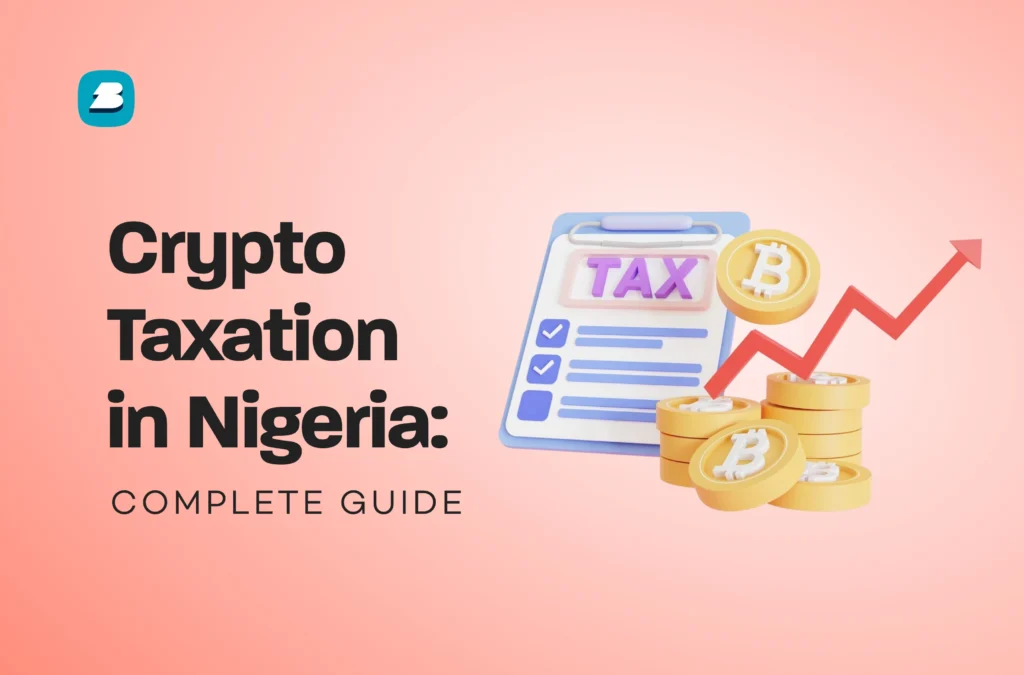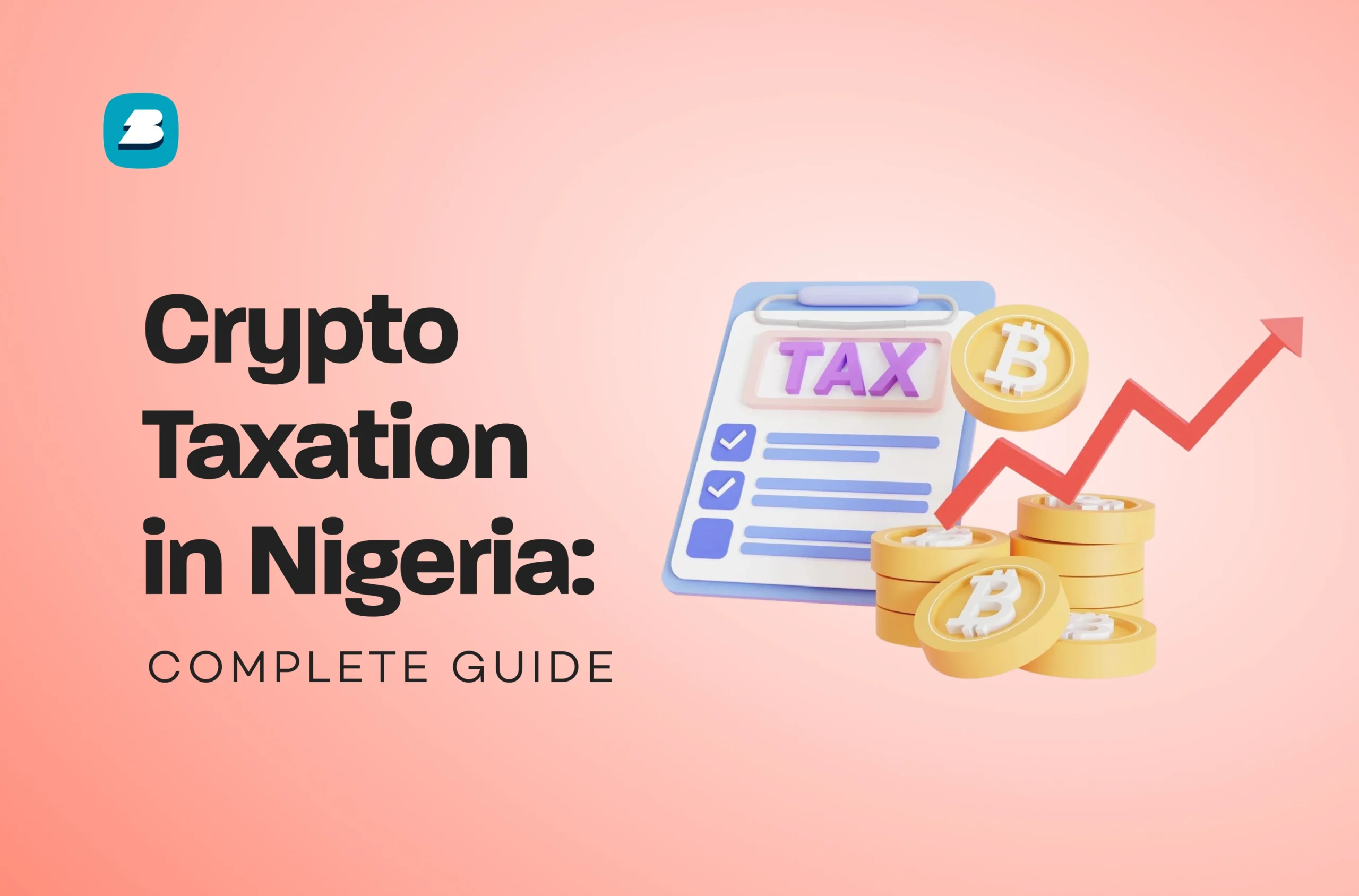With Nigeria ranking among the world’s top countries for crypto, the government has finally introduced tax rules that every crypto trader needs to understand and follow.
This guide will explain everything you need to know about crypto taxation in Nigeria, from the basic tax rates to reporting requirements and how to minimize your taxes legally.
Who is in Charge of Crypto Tax in Nigeria?
Two authorities manage crypto taxation in Nigeria:
The FIRS is the main tax authority that collects crypto taxes and ensures compliance. On the other hand, the SEC regulates crypto exchanges and digital asset service providers.
Crypto taxation in Nigeria was introduced through the Finance Act 2023, which officially placed cryptocurrency under the country’s tax system. In 2025, the Investments and Securities Act (ISA) added more regulations, classifying cryptocurrencies as securities.
How Nigeria Treats Cryptocurrency
In Nigeria, crypto is NOT a legal tender like our Naira currency. You can’t just pay for tomatoes and garri with your Bitcoin. Instead, it is classified as digital property, like owning land. This determines how your crypto activities are taxed.
Think of it like this: when you buy and sell crypto, the government treats it similar to trading stocks or real estate: any profit you make becomes taxable income.
You may want to know the types of crypto taxes you pay. Let’s find out.
The Three Main Types of Crypto Taxes
Let’s start with the types of crypto taxes there are. We have:
1. Capital Gains Tax or CGT
This has a rate of 10% as of 2024, but changing to income tax rates up to 25% by 2026. This applies when you sell cryptocurrency for a profit.
For example, if you buy Bitcoin for ₦500,000 and sell it for ₦700,000. Your capital gain is ₦200,000, and you’ll pay 10% of this profit as capital gains tax. In other words, #20,000 will be taken out as tax.
2. Income Tax
Income tax on crypto is charged at rates from 7% to 25% depending on your total income.
This is charged from earnings from crypto mining, staking rewards, airdrop tokens you receive and salary paid in cryptocurrency. It is also charged if you use crypto as a means of payment in your main business.
3. Value Added Tax (VAT)
Value Added Tax is charged at 7.5% and is part of the fees charged by crypto trading platforms and exchanges, not on the crypto itself. Luckily, Breet charges zero fees so you have nothing to worry about.
Related:
- 9 Best Crypto OTC Trading Platforms in 2025
Special Rules for Different Types of Users
Crypto tax in Nigeria depends on the kind of trader you are:
Individual Crypto Traders
- Pay capital gains tax on profitable trades
- Must report all transactions above ₦5 million
- Get a ₦10,000 annual capital gains tax exemption
- Can offset losses against gains in the same year
Cryptocurrency Businesses and VASPs
- Pay 30% corporate income tax on profits
- Must register with SEC and FIRS
- Required to maintain detailed transaction records
- Face penalties of ₦10 million for first month of non-compliance
Crypto Miners and Stakers
- All rewards treated as regular income
- Must pay income tax at progressive rates
- Can deduct business expenses like equipment costs
- Need to track the Naira value of rewards when received
Recommended:
- 11 Best Crypto Forums of 2025
Reporting and Compliance Requirements

Every crypto user in Nigeria must track and report:
- Transaction dates (When you bought, sold, or received crypto)
- Transaction amounts (How much crypto was involved)
- The equivalent Naira value at the time of each transaction
- Purpose of the crypto transaction (Trading, investment, or business activity)
Important deadlines not to miss as a crypto user include:
- For Individuals: March 31st each year
- For Companies: June 30th each year
Missing these deadlines triggers automatic penalties starting at ₦10,000 or 5% of your unpaid tax, whichever is higher.
How to File
To file any tax-related report, use the TaxPro-Max online system provided by FIRS. The system allows you to upload your transaction records, calculate your tax liability, make payments electronically and track your compliance status.
How to Minimize Your Crypto Tax in Nigeria, Legally
Here’s how you can reduce your taxes without any legal issues:
- Keep Detailed Records
- Use platforms like Breet that provide detailed transaction histories
- Document every trade with screenshots and receipts
- Note the Naira value at the time of each transaction
- Claim Legitimate Deductions
- Mining expenses
- Trading fees
- Professional services
- Loss offsetting
- Take Advantage of Exemptions
- ₦10,000 annual capital gains tax exemption for individuals
- Small company exemptions for businesses with turnover under ₦100 million
- Plan Your Transactions
- Consider timing large sales across different tax years
- Harvest losses strategically to offset gains
- Use the annual CGT exemption effectively
You Might Like:
What Happens If You Do Not Pay Crypto Tax in Nigeria?
Nigeria now taxes digital assets, including crypto, and the Federal Inland Revenue Service (FIRS) is paying closer attention.
The Finance Act of 2023 introduced a 10 percent capital gains tax on profits from selling digital assets, while the newer Tax Administration Act of 2025 gives FIRS more power to enforce penalties.
FIRS is already going after big platforms, like in the case against Binance, and they have more tools to catch people.
They can use KYC information from exchanges, data sharing with other agencies, and blockchain analysis to connect crypto transactions to real users. This makes it much harder to stay under the radar.
The punishment for not following the rules is not small. Fines can start around ₦10,000, but the reality is that they can climb much higher.
For businesses and licensed crypto providers called VASPs, penalties can reach ₦10,000,000 in the first month of non-compliance and ₦1,000,000 for each month after that.
Individuals can also face larger fines or even jail time if they are found guilty of intentional tax evasion.
It is also worth noting that some parts of the new tax rules will continue rolling out into 2026, but this does not mean you are safe today. FIRS has already shown that it is ready to enforce the law even while the system is being phased in.
In simple terms, you should not ignore crypto taxes in Nigeria.
Keep clear records of every transaction, calculate gains correctly, and declare them when filing your taxes.
If you run a crypto business, make sure your compliance policies are updated to avoid the heavy penalties. If you think you may have failed to report in the past, getting advice from a tax professional and considering voluntary disclosure is a safer path.
Upcoming Crypto Tax Update
- Higher Taxes on Individual Transactions
From now on, profits made from crypto deals in Nigeria won’t just attract the old 10% capital gains tax. Instead, they’ll be treated as chargeable gains under personal income tax, with rates climbing as high as 25%.
This new rule officially replaces the Finance Act 2022’s lighter 10% levy. It will put crypto earnings squarely in the same tax bracket as other personal and corporate incomes.
- Exchanges Face Strict Reporting Rules by 2026
From January 1, 2026, Crypto exchanges in Nigeria will have to play by stricter rules.
They’ll be required to report every user transaction to the tax authorities. Failure to comply could cost them their operating license.
(See full 2025 Tax reform in Nigeria here)
Crypto Tax in Nigeria: What Is Expected of You as an Individual

If you trade or invest in crypto as a Nigerian resident, you are expected to follow the same tax rules that apply to other assets. This means:
- Pay capital gains tax: When you sell or swap crypto for a profit, the gain is subject to a 10 percent capital gains tax. This tax is applied only to the profit (chargeable gains) made from the transaction, not the total amount. Losses can be recorded but gains must be declared.
- Keep proper records: You should track every transaction, including the date, the type of asset, the value in naira at the time, and any fees paid. This makes it easier to calculate your true gains.
- File and pay on time: When filing your annual tax return, include your crypto transactions and pay any tax due to avoid penalties.
- Be truthful: Giving false information or hiding profits can lead to higher fines or even criminal charges.
- Stay updated: Tax rules for crypto are still developing in Nigeria, so keeping an eye on new guidelines from FIRS is important.
In short, you are expected to treat crypto like any other taxable investment. By keeping clear records and paying the right tax on your profits, you avoid fines, protect yourself from legal trouble, and stay on the right side of the law.
Don’t Miss:
How Breet Helps You Stay Compliant
As Nigeria’s leading crypto trading platform, Breet makes tax compliance easier by providing detailed transaction histories.
It also helps you stay updated with all tax requirements and supports automatic reporting, which makes it easy to export tax-relevant information.
With Breet, you get the best trading experience while maintaining full compliance with Nigerian tax laws.
Frequently Asked Questions on Crypto Tax in Nigeria
Is Cryptocurrency Taxable in Nigeria?
Yes. Since the Finance Act of 2023, profits from selling or swapping cryptocurrency are subject to capital gains tax in Nigeria.
How Much Tax will I Pay on Crypto?
You pay 10 percent of your net gains. This means you calculate the difference between your selling price and your buying price (minus fees), then apply 10 percent on the profit.
How Much Tax is Applicable on Crypto?
The current rate is 10 percent capital gains tax on profits. If you make no profit, there is no capital gains tax to pay.
Does SARS Tax you on Crypto?
No. SARS is the South African Revenue Service, not Nigeria’s. In Nigeria, it is the Federal Inland Revenue Service (FIRS) that handles crypto tax.
Do I Pay Income Tax on Cryptocurrency?
You generally pay capital gains tax when you sell at a profit.
However, if you earn crypto as income (for example, salary, freelance payments, or staking rewards), that may be treated as regular income and taxed under normal income tax rules.





